A number one followed by one hundred zeros is known by what name?
This was the one million pound question facing Major Charles Ingram as he sat in the famous Who Wants To Be A Millionaire? hot seat opposite host Chris Tarrant in September 2001.
"I'm not sure," was his initial reaction. "However…"
After initially stating he thought the answer could be nanomole, he had a sudden change of heart and - standing to lose £468,000 if he got it wrong - went for googol, despite admitting he had never heard of a googol.
After a cliff-hanger break, in true Who Wants To Be A Millionaire? style, Tarrant dramatically ripped up the £500,000 cheque Ingram could have walked away with - and declared him a new millionaire.
But the victory was short-lived. This was the cheating scandal that became a national obsession; the story of the "Coughing Major", the contestant who at first seemed to have beaten all the odds, answering 15 questions correctly to become one of just a handful of top-prize winners on one of the most popular British shows.
But in 2003, Ingram was found guilty, along with his wife Diana and their coughing accomplice, Tecwen Whittock, of cheating their way to the jackpot.
Now, the scandal is set to be played out on screen in new three-part drama Quiz, starring Michael Sheen as Chris Tarrant, and Matthew Macfadyen and Sian Clifford as Charles and Diana Ingram.
Ahead of the show's launch, writer James Graham speaks to Sky News about his research.
The TV phenomenon of Who Wants To Be A Millionaire?
In today's world of streaming, and with quiz shows on at all hours of the day, it's hard to overstate the impact Who Wants To Be a Millionaire? made when it launched in 1998.
The idea was so simple: answer 15 questions in a row correctly, win a million pounds. You were also given three lifelines - 50/50, phone a friend, ask the audience. On paper it seemed easy, but very few made it to the final question.
"I remember the very first run of Who Wants To Be A Millionaire?," says Graham. "Trying to communicate to an audience that's now so familiar with this game show, quite how quietly radical it was and the scale of the impact it had on popular culture... it was extraordinary for, you know, a relatively simple question and answer game.
"For whatever reason, it totally captivated me. I watched the first episode and I remember the first contestants. In the drama we include real archive footage of the second contestant ever in the chair. I don't know why but I have such a vivid memory of watching her with my grandparents.
"She was so emotionally invested in the game and she rang her dad as the first ever phone a friend, I think. She couldn't believe that so much money was up for grabs and she was trying to plan her wedding, which she couldn't afford. It was this fairy tale story and I remember getting properly emotionally involved in it.
"The Ingrams case, like everyone else I followed it and was obsessed by it. I couldn't believe that somebody would try to steal a million pounds in front of television cameras and a live audience and microphones. And, probably like the majority of people at that moment, I just assumed that they were bang to rights."
The cheating scandal
On the surface, it appeared Ingram had somehow stumbled his way to TV quiz show notoriety, finding the right answers for his final questions seemingly out of nowhere, flitting between options after using most of his lifelines early on.
"You are the most amazing contestant we have ever, ever had," Tarrant said as he announced the win and hugged him.
But producers behind the scenes were immediately suspicious at the erratic way Ingram found his way to victory.
Like the "Nasty Nick" Big Brother scandal which had come the year earlier - which saw contestant Nick Bateman trying to influence other housemates' voting by writing on paper - the Who Wants To Be A Millionaire? scandal dominated headlines.
It's hard to imagine similar behaviour now, on a TV show such as Love Island or The Chase, say, having quite the same effect.
"Yes, nothing happens in a vacuum and culturally, Millionaire came out of the emergence of this reality TV culture that felt very new - putting normal members of the public on television screens and often putting them under quite intense, extreme conditions to see how they behaved," says Graham.
"The similarity to Big Brother of course is that what we want as an audience is all of the classic tropes of a traditional narrative but imposed upon real life. We want a villain and we want a beginning, a middle and end. We want justice and we want the climax and we want the resolution.
"People wanted the Ingrams to be found guilty because the behaviour was strange and so it had to have a very simple answer: that he cheated."
Nineteen coughs
Back in 2001, there were no iPhones for Whittock to quickly Google the answers to the questions. Coughing could certainly have been the method of communicating, but how did they know they had it right?
"One of arguments the prosecution always made is on that million-pound question, the way that Charles answered it was that he said he'd never heard of the right answer before," says Graham. "He was just taking a guess. And they argue, well, would you risk all that money if you weren't entirely sure?
"He has his own reasons for why he performed in the way he did, which we show in the third episode of the drama when they're making their defence. Essentially, he was trying to be as entertaining, he says, as he possibly could because he believed that might make him stay in the chair longer, determine the questions that were asked - which the prosecution and the producers completely dispute.
"For the crime to have been successful it completely demands that Charles Ingram can pick out the specific cough of his accomplice behind him over all of the other coughs going on around him, and that that person will know all of the answers.
"There are 19 significant coughs that correlate with moments when the major is listing the right answers. It's those 19 coughs that make up the majority of the case. But we don't actually know with any great deal of certainty that those 19 actually came from Tecwen Whittock. They just appear on an audiotape from the area, from a general mic covering the area where Tecwen was sat. So we don't even know if all 19 were coming from someone cheating.
"And it completely demands that Tecwen Whittock is also a genius.
"What's interesting is - and I completely forgot this part of the case - Tecwen got in the chair after Charles Ingram, he was the next contestant, and he actually only got up to £1,000. And in previous quiz appearances he hadn't necessarily done exceptionally well. So you question why the major trusted somebody who actually he had never met, they've never spent any time together, to determine the fate of the performance and how much money he was going to win?
"When producers were trying to work out how the major may have cheated - in the days afterwards, they didn't even necessarily alight upon the coughing as the definite way that he did it - they started to really panic at how vulnerable the studio was.
"For example, they realised that the show relay that all the crew speak on during the production - and obviously that would include the listing and talking about the questions - that could actually be heard in the car park by radio transmitter. They started to think, oh my god, are obsessed quiz fans in the car park with encyclopedias communicating back to people in the studio somehow?
"There was one theory that the major had four pagers strapped to his body - answer A on this arm, answer B on his right arm, answer C on his left leg, that kind of thing - and people were buzzing in from outside the studio. They don't know if that's true. But the technology for accessing the world's information wasn't quite as sophisticated as it is now."
The world of extreme quizzing
During his research, Graham realised there was much more to the story than one couple wanting to win a TV quiz show.
"This world to spend time in with these people was a great joy as a writer," he says. "Partly because I think a lot of what it's about is kind of in celebration of English eccentricity.
"In the opening episode we explore the fact that Charles and Diana weren't the only people who allegedly were fixated by this game show, there was a whole community of quizzers that sprung up who were absolutely determined to break into the show. Some of them formed a professional outfit, which we call The Syndicate, which was a real outfit.
"They basically wanted to assemble some of the country's best pub quizzers to help clients, whoever they were, to get into the chair... they worked out some probabilities of how you could phone up and get selected, put on the show. And they had a secret room where they had a phone.
"Hundreds of contestants that they put into the chair, their phone a friend would be diverted to this secret phone in this secret room, where a dozen or so of the country's best quizzers would be there with encyclopedias waiting to help with the answer. They would take 25% of whatever that client won.
"This organisation won, took millions of pounds of the prize money. You can argue over the morality and the ethics of that - and we do in the show - but what it does kind of portray, I think, is unlike American heist movies, where it's all guns and car chases and abseiling through glass ceilings, this is an English heist story about middle class people wandering about Wiltshire with encyclopedias and reference books. I have a natural affection towards that kind of story."
Michael Sheen as Chris Tarrant
Like the other real-life characters portrayed in the show, Chris Tarrant got to see it in advance.
Sheen - who has famously played Tony Blair, Sir David Frost and Brian Clough - watched hours of tapes from the original show as part of his research to play its host.
"He has been very polite," Graham says of Tarrant. "He's very robust in his views... he doesn't hold back. He has been very complimentary about the quality of the production and the actors in it, which is great, and also maintains that they are absolutely guilty.
"We're happy to have him countering our narrative very aggressively with his own point of view, because that's what you want, you want to generate a conversation. He likes the drama a lot but won't tolerate for a second the idea that they didn't do it.
"I find Chris Tarrant's role in this scandal really fascinating. He really goes on a journey. He didn't notice anything at the time and he really liked the major when he met him. In court, even though he was called for the prosecution, he had to be honest.
"When he was asked, did you notice any coughing at the time or anything suspicious at all, he said no. That's the truth. I think he behaved with incredibly integrity around this show that he really loved. And I think Michael Sheen, one of our greatest actors, captured that really well."
Both sides of the case
The Ingrams have been aware of Quiz from early in its development as a stage play before the TV show, says Graham.
"They had contributed already to a book that came out called Bad Show, by Bob Woffinden and James Plaskett, and that was the first kind of re-interrogation of this case, challenging some of the accepted narratives around their guilt. It pokes a hole in some of the inconsistencies in the evidence and just asks the fundamental question, can we ever really know whether Charles Ingram knew or didn't know the answers to those questions?
"I think obviously [the Ingrams] were nervous [about the show]. These are normal people who went through an extraordinary event in their lives. And I don't imagine, well, I know for a fact they don't want to be dragged back into the national spotlight anytime soon.
"But I think because the whole proposition behind the drama is to demonstrate that not everything is quite as black and white with this story, or as simplistic as it was reported previously - there are a lot of grey areas and we do give them the opportunity, much like the prosecution, to make their case. We give them a chance to defend themselves. So I think they're quietly pleased that for once they're going to at least get their point of view across."
Asked if his opinion about the case has changed since researching the story, he instead says that his feelings have changed.
"The way that the Ingrams were portrayed in the media... whether they are guilty or innocent, I thought it was quite cruel. They were mocked, they were lampooned and satirised over this alleged crime.
"They were convicted and that is currently as it stands, the verdict. I think what they went through as a result of this, in terms of the human cost and personal cost to them and their family; one of the things we want to explore in the drama was whether that was proportionate to what they were being accused of and what all of our complicity is in that, in enjoying the blood sport of watching people be taken down and then destroyed.
"In the research I've met people on both sides. I've met and spent time with the producers and the creators of the show, who firmly still believe that the Ingrams are guilty. And I believe that's sincere and I like them. I also spent time with the Ingrams and the people who were accused, and I like them too. And they still maintain their innocence.
"The joy of this story for me is it follows a structure of a crime drama but really there's no bad guys, in my view. Everyone, I hope, comes out of the drama quite well."
:: Listen to the Backstage podcast on Apple Podcasts, Google Podcasts, Spotify, Spreaker
The million-pound question
Graham won't say whether he thinks the Ingrams are guilty.
"I fully respect the desire to know [my opinion], but for me - and it's ironic for a show about questions and answers and correct and incorrect answers - but I really do think that it's our duty just to ask the question. Then it's up to the audience; it's classic Who Wants To Be A Millionaire? because we're going to ask the audience what they think, we're not going to tell them with any certainty what it is we think.
"But also the truth is, I don't know. Nobody will ever know. There's only about three people in the world who know for sure exactly what happened and how it happened. So we just present both cases, try and give people a fair hearing and do it in an empathetic but hopefully entertaining way."
Quiz starts at 9pm on Easter Monday on ITV
Entertainment - Latest - Google News
April 13, 2020 at 11:28PM
https://ift.tt/3a33F87
Who Wants To Be A Millionaire? How Quiz tells the story behind the infamous cheating scandal - Sky News
Entertainment - Latest - Google News
https://ift.tt/2AM12Zq
Bagikan Berita Ini
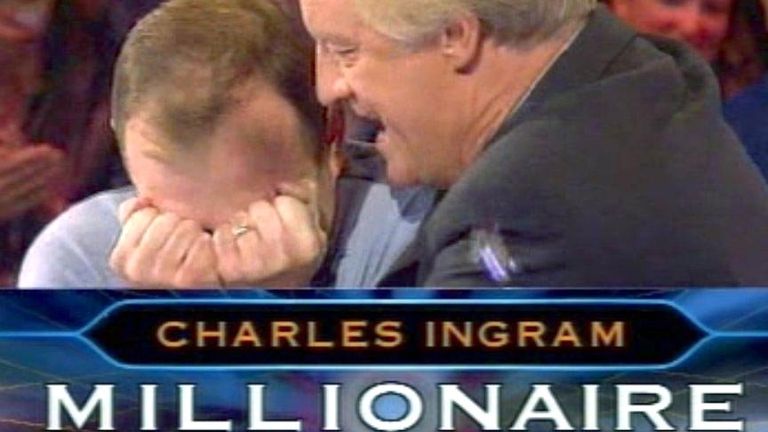

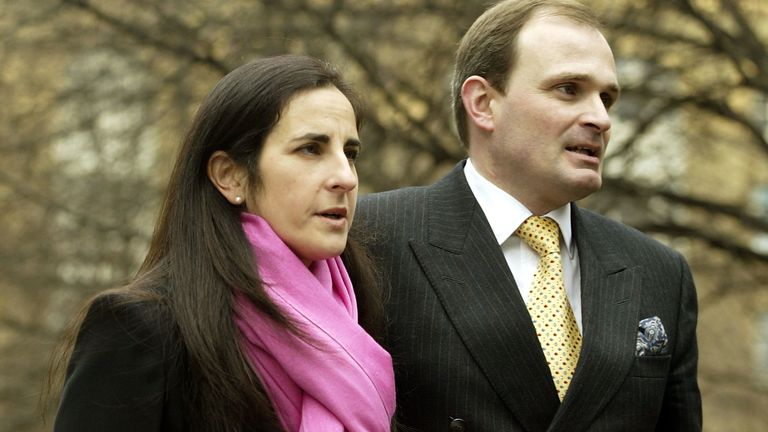
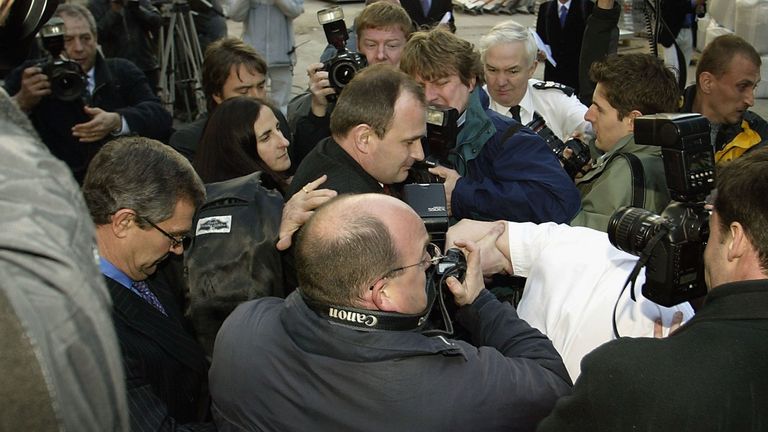
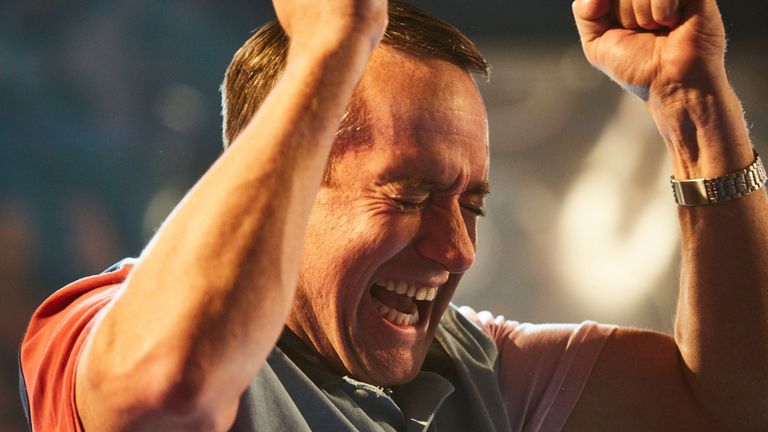

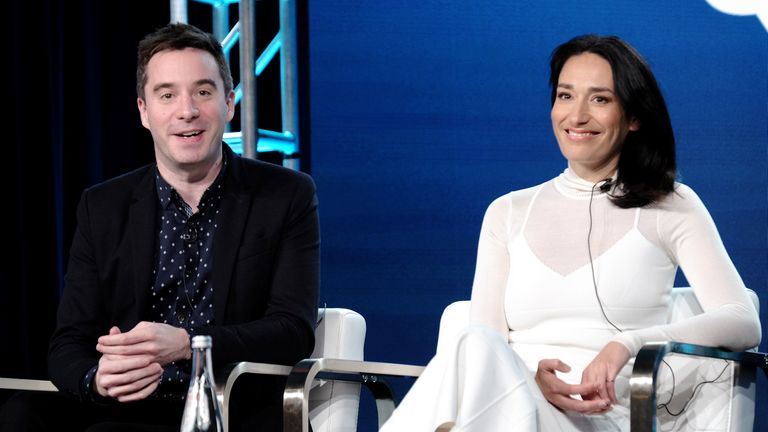














0 Response to "Who Wants To Be A Millionaire? How Quiz tells the story behind the infamous cheating scandal - Sky News"
Post a Comment